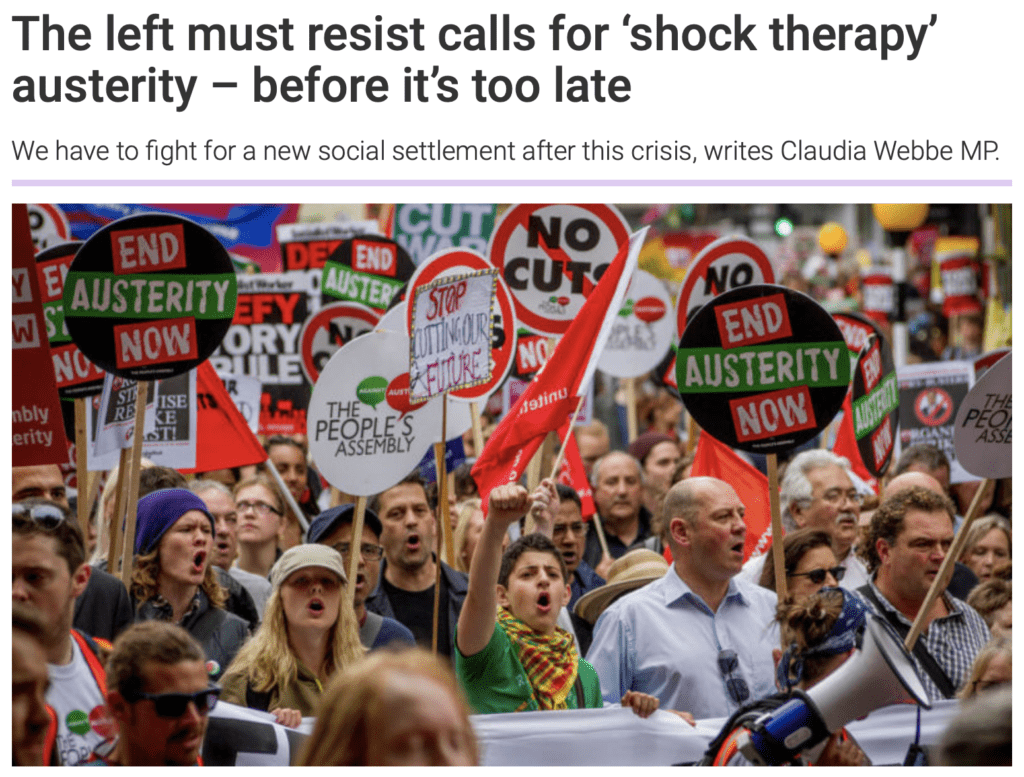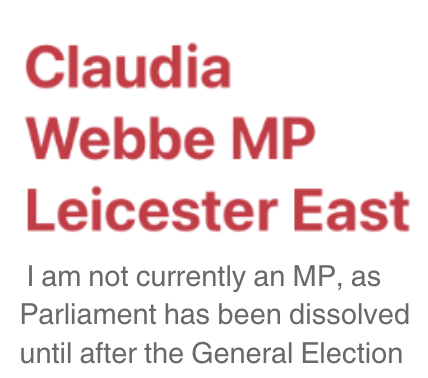
The left must resist calls for ‘shock therapy’ austerity – before it’s too late
By Claudia Webbe MP
We have to fight for a new social settlement after this crisis, writes Claudia Webbe MP
During this coronavirus crisis we have experienced our dependence on each other. And we’ve seen how – as Boris Johnson himself has now admitted – Margaret Thatcher was wrong when she claimed there was no such thing as society.
We have also seen how much we all depend upon those who have been undervalued for far too long.
This was confirmed by research published by the IFS (Institute for Fiscal Studies) in late April showing those termed as key workers are paid hourly wages on average 8% lower than other employees.
Our key workers who are keeping the country going, keeping us fed and keeping us safe deserve better. As Labour’s Shadow Secretary of State for Employment Rights and Protections Andy McDonald put it: “Cleaners, carers, and refuse collectors are just a few of those we rely on for the most essential things that keep our society running, and who are now routinely putting their lives on the line to get us through this crisis.”
No going back
We need government to redress the great debt that we owe to these and other undervalued workers in the economy – both in the private and public sectors – by boosting their wages, conditions and their rights.
This is just one aspect where there should be no return to ‘business as usual’ or austerity, as leading economists warned this week. After the amazing efforts and sacrifices we are seeing across every community and locality in Britain – and the drastic measures that have been taken in so many areas of our economy and society – people will rightly not accept a return to the growing insecurity that marked the last decade in particular.
A return to ‘business as usual’ when it comes to how our economy is restructured – let alone a further dose of severe austerity – would be deeply damaging for both our economy and society.
We can no longer tolerate the inequality and insecurity that has left all of our society, public services and households less resilient than we should have been when facing this crisis.
The last ten years of ideologically-driven austerity has meant our NHS and other essential public services have been starved of vital resources. This has been accompanied by a steadfast refusal from the Tory government to treat our vital public servants decently when it comes to their pay and conditions.
We have seen a normalisation of high levels of poverty and inequality, a homelessness crisis on our streets and, as of last year, the longest wage squeeze in recorded history leading to a growing cost-of-living crisis.
The current crisis – with its severe economic impacts – has exposed and will be deepening many of these problems.
Poverty before the pandemic
To give one clear example, the recent figures on low income households published by the government highlighted that even before the current crisis, there was a sharp rise in the number of people in poverty, including an increase in-work poverty.
Specifically, these figures for Households Below Average Income, showed that the number of people in relative low income after housing costs (AHC) rose by 500,000 and absolute low income AHC by 400,000.
While the government propaganda machine has regularly claimed that part of the austerity years has been a focus on making work pay, this simply isn’t the case. Instead, after the four-year freeze of working-age benefits and escalation of insecure working, poverty has increased and food bank use has soared.
In their totality, poverty data in March showed a record high of 14.5 million people in poverty.
With the flood of new Universal Credit claims and other developments during this crisis, it is likely that when these figures are published in the future they will show a picture of even more people pushed into poverty and left at risk of destitution.
As millions of workers are furloughed on 80 per cent of their usual wage, or being forced to claim Universal Credit with a five-week delay in payments, we need to act to immediately ensure people have the support they need to make ends meet. There should be a boost to Universal Credit to at least £260 a week and the five-week wait for support should be scrapped.
Recent weeks have also seen the TUC repeatedly warn that we could be on the brink of another economic crisis and millions of people’s livelihoods are at risk.
Unemployment had already increased by 22,000 to 1.36 million in the three months to February, even before Covid-19 ‘lockdown’ measures were put in place.
These very real dangers our economy faces mean that the labour movement must demand both further action to limit the slide into an economic recession now. But we must also see a commitment to building a different and more equal economy in the years ahead.
Calls are emerging for ‘shock therapy’ hard-line austerity to ‘reset’ the economy after this crisis. We must firmly resist them.
Claudia Webbe MP is the member of Parliament for Leicester East. You can follow her at www.facebook.com/claudiaforLE and twitter.com/ClaudiaWebbe


